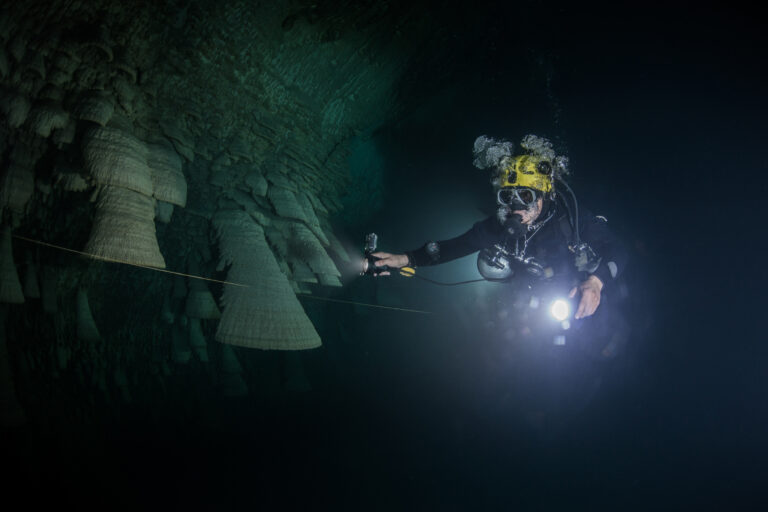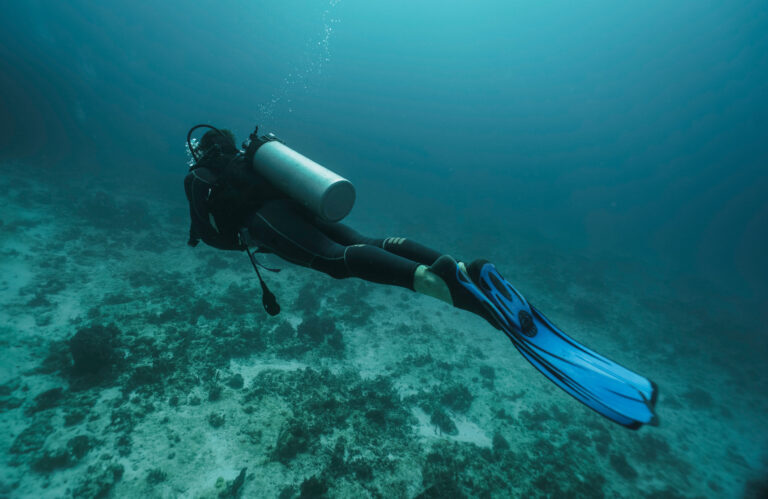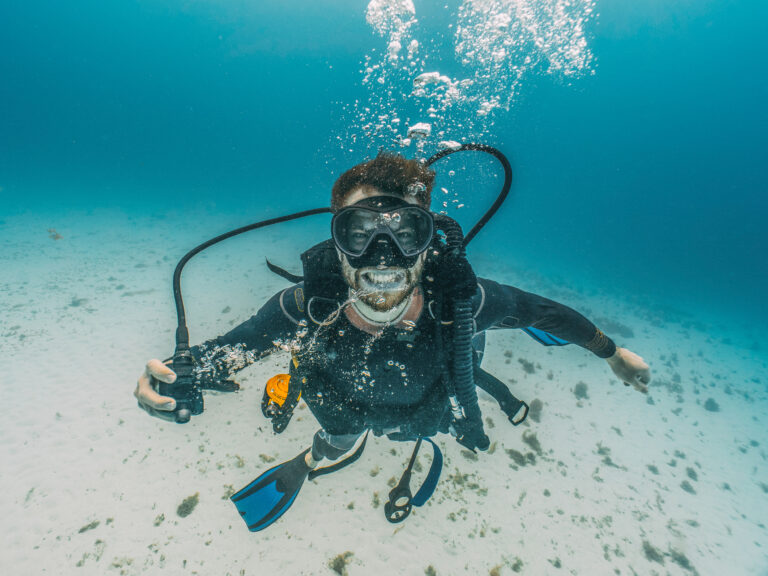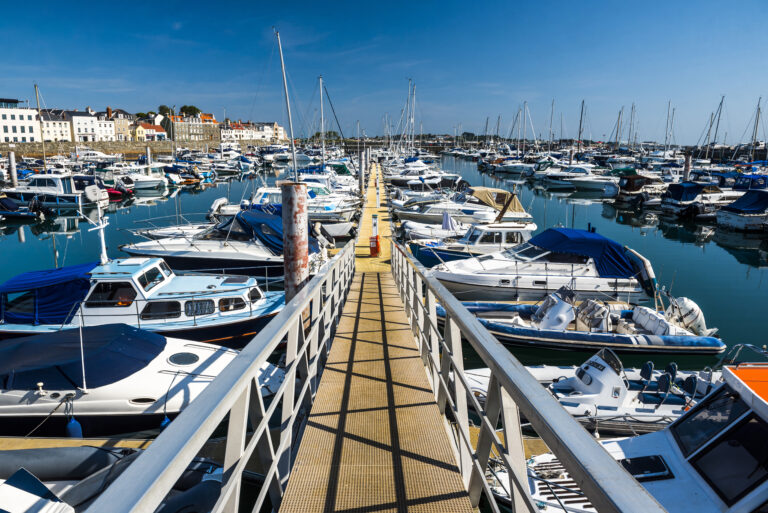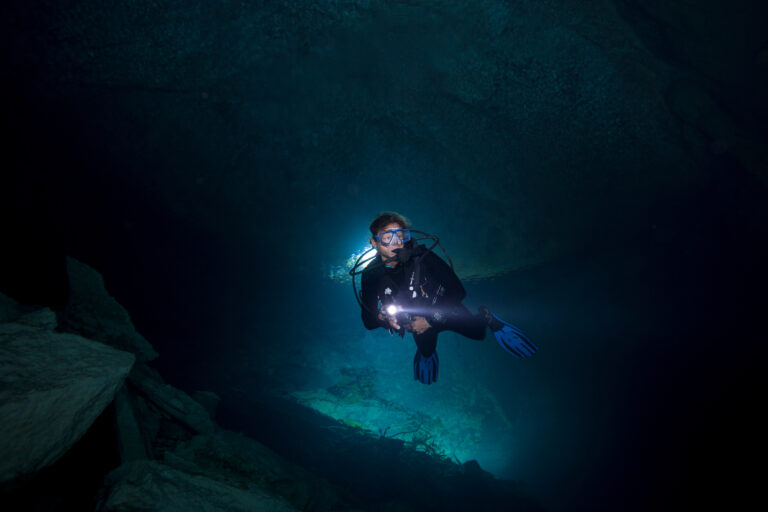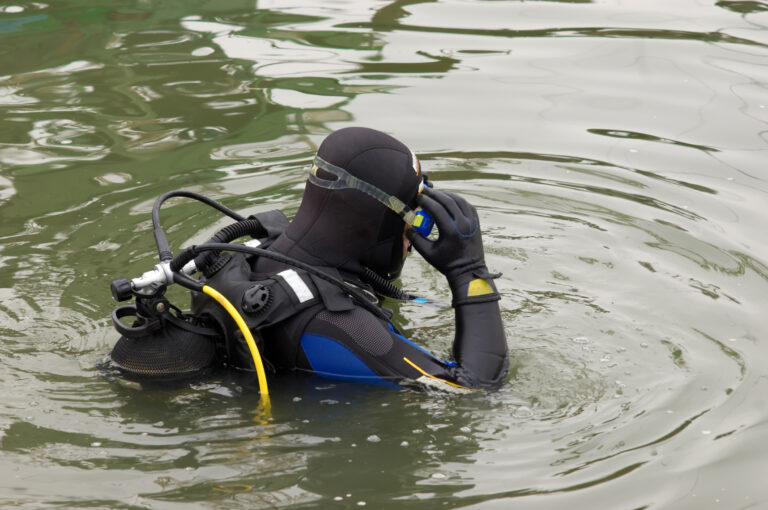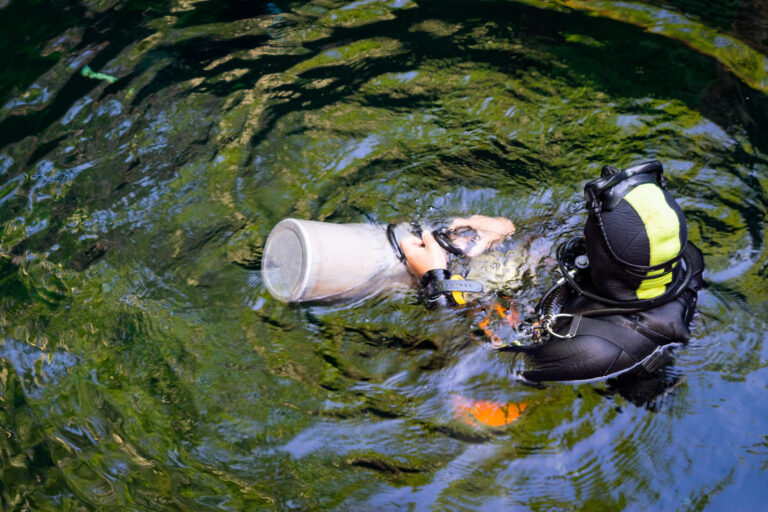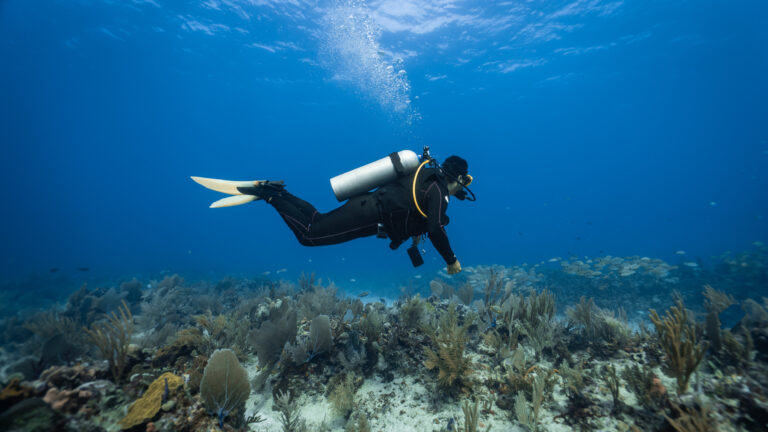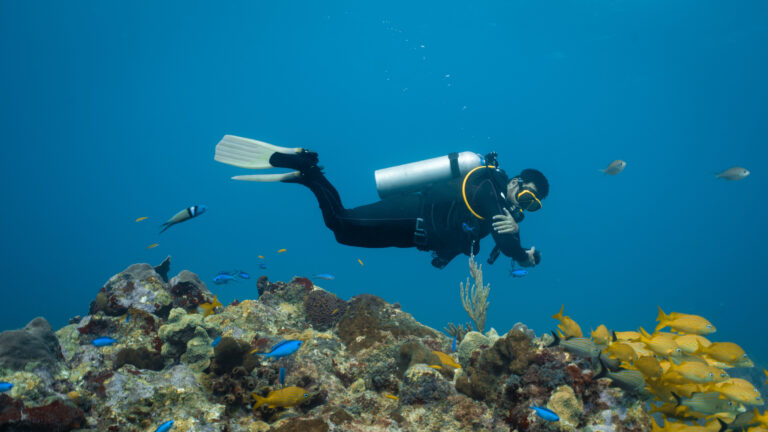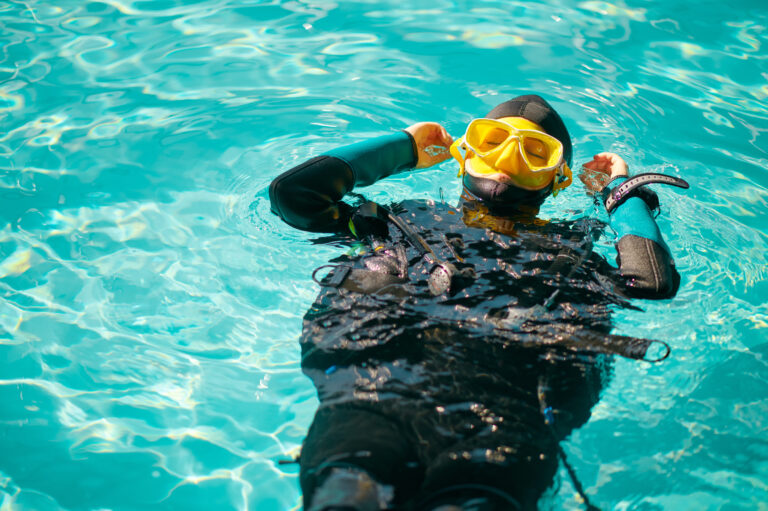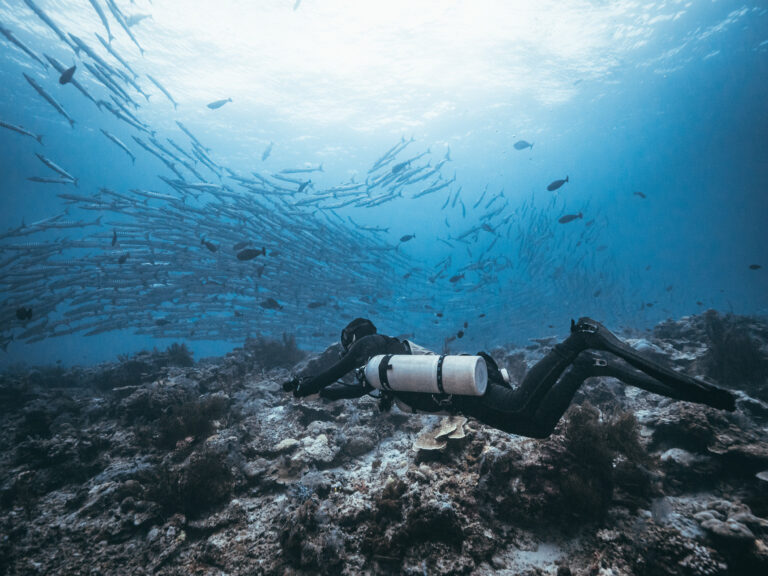SCUBA DIVERS’ TRAVEL GUIDE TO Greece
Greece is a scuba diver’s paradise, with thousands of islands and a rich history to explore. Whether you want to dive into ancient shipwrecks, colorful coral reefs, or underwater caves, Greece has something for everyone. You can enjoy the warm and clear waters of the Mediterranean Sea, the Aegean Sea, or the Ionian Sea, and discover the diverse marine life that inhabits them. From octopuses and dolphins to seahorses and nudibranchs, you will be amazed by the variety and beauty of the underwater world. Greece also offers a vibrant culture, delicious cuisine, and stunning scenery on land. You can visit the iconic Acropolis, sample the famous Greek yogurt and olives, or relax on the white sand beaches. Greece is a destination that will enchant you with its charm and adventure.
LOCATION AND GEOGRAPHY
Greece, a country steeped in ancient history and adorned with a myriad of islands, offers a scuba diving experience as rich and varied as its mythology. Nestled at the crossroads of Europe, Asia, and Africa, Greece boasts an extensive coastline that spans over 13,676 kilometers, fringed by the crystal-clear waters of the Aegean and Ionian Seas. The diverse underwater topography is a product of the region’s tumultuous geological past, featuring a spectacular array of caves, caverns, and canyons, alongside a wealth of sunken cities, shipwrecks, and remnants of civilizations past. The Greek archipelago, comprising over 6,000 islands and islets, of which only 227 are inhabited, provides a multitude of unique diving locales. From the volcanic formations of Santorini to the marine life-rich waters of Crete, and the historical underwater sites of the Peloponnese, Greece’s varied geography offers a treasure trove of underwater exploration for divers of all levels.
VISA AND ENTRY REQUIREMENTS
Before embarking on your underwater adventure in the crystal-clear waters of Greece, it is essential to ensure that your travel documents are in order. Citizens of the European Union (EU), European Economic Area (EEA), and Switzerland can enter Greece without a visa and stay for an unlimited period. However, travelers from many non-EU countries, including the United States, Canada, Australia, and New Zealand, can visit Greece visa-free for up to 90 days within a 180-day period for tourism purposes, which includes scuba diving. If you are from a country that requires a visa, you will need to apply for a Schengen visa, which allows you to travel to Greece and other Schengen Area countries. Always check the latest visa requirements with the Greek consulate or embassy in your home country well in advance of your trip, as regulations can change. Additionally, ensure your passport is valid for at least six months beyond your planned departure date from Greece, and keep in mind that border officials may ask for proof of return or onward travel, as well as sufficient funds for your stay.
GETTING TO Greece
Getting to Greece for an unforgettable scuba diving adventure is a straightforward journey, thanks to the country’s well-established tourism infrastructure. Major airlines from around the globe offer direct flights to Athens International Airport, the nation’s primary gateway, with seasonal charters serving popular islands during peak tourist months. For those looking to dive into the Aegean or Ionian Seas, connecting flights, ferries, and high-speed boats provide access to renowned islands like Crete, Rhodes, and Zakynthos. Upon arrival, divers can revel in the crystal-clear waters, exploring underwater caves, ancient wrecks, and vibrant marine life. Whether you’re flying into the bustling capital or setting sail to a remote island paradise, Greece’s extensive network of transport options ensures your journey will be as smooth as the calm Mediterranean tides.
BEST TIME TO DIVE
The best time to scuba dive in Greece is generally from May to November when the Mediterranean waters are warmest and visibility is at its peak, offering clear views of the diverse underwater landscapes and marine life. During these months, water temperatures range from 19°C to 29°C (66°F to 84°F), making for comfortable diving conditions. The summer months of July and August can be particularly busy with tourists, so for a more serene diving experience, consider the shoulder seasons of May-June or September-October. These periods offer a balance of pleasant weather, fewer crowds, and still boast excellent diving conditions. Additionally, many dive sites are less frequented, allowing for a more intimate encounter with Greece’s underwater treasures, including ancient ruins, colorful reefs, and a variety of Mediterranean sea life.
ACCOMMODATION OPTIONS
Greece, with its myriad of sun-drenched islands and crystal-clear waters, offers a plethora of accommodation options for scuba divers seeking to explore its underwater marvels. From the Cyclades to the Dodecanese, each region presents a unique set of choices ranging from luxurious beachfront resorts that cater to every whim to quaint, family-run guesthouses that promise a more authentic Greek experience. Many accommodations are geared specifically towards divers, providing amenities such as gear storage, rinse tanks, and easy access to dive shops or on-site diving centers. For those who prefer a touch of seclusion, private villas and bungalows are scattered along the coastlines, often with stunning sea views and quick access to dive sites. Budget-conscious travelers can find comfort in the numerous hostels and budget hotels that do not compromise on the convenience of proximity to diving locations. Whether you’re looking to indulge in the comforts of a full-service stay or simply need a cozy spot to rest between dives, Greece’s range of accommodations ensures that every diver can find their ideal home away from home beneath the Mediterranean sun.
DIVE OPERATORS AND DIVE SHOPS
In the crystalline waters of Greece, a plethora of dive operators and shops await to cater to the needs of underwater adventurers, from the sun-drenched shores of Crete to the ancient submerged ruins off the Peloponnese. Greek dive shops are renowned for their hospitality and professionalism, often providing a full suite of services including equipment rental, dive courses, and guided excursions to an array of dive sites suitable for all levels of experience. Whether you’re looking to explore the vibrant marine life of the Aegean Sea, the mysterious caverns of the Ionian islands, or the historic wrecks dotting the Mediterranean seabed, these local experts are equipped with the knowledge and resources to ensure a safe and memorable experience. With a commitment to safety and a passion for sharing the underwater wonders of their homeland, Greek dive operators are your gateway to the rich tapestry of marine biodiversity and cultural heritage lying beneath the waves. Always remember to check for certifications from recognized diving associations and to read reviews to select a reputable dive shop that aligns with your diving needs and conservation values.
TRANSPORTATION WITHIN Greece
Transportation within Greece offers a variety of options to access its myriad scuba diving destinations, catering to the needs of underwater enthusiasts. The country’s extensive ferry network is a lifeline to the numerous islands, where some of the best dive sites are located, such as the wrecks at Santorini or the caverns of Zakynthos. For those looking to explore the mainland’s coastal offerings, such as the biodiverse waters of the Peloponnese peninsula, renting a car can provide the flexibility to travel along the scenic routes at your own pace. Public buses also serve many coastal areas and are a cost-effective way to reach popular diving spots. For quicker transfers, domestic flights connect Athens to major islands and coastal cities, shortening travel time to ensure more time can be spent submerged in the crystal-clear Aegean and Ionian Seas. Regardless of the mode of transport, it’s advisable to plan ahead during peak season, as services can be busy, and booking in advance ensures a smooth journey to your underwater adventure.
CURRENCY AND PAYMENT METHODS
In Greece, the official currency is the Euro (€), which is the most widely accepted form of payment across the country’s numerous idyllic scuba diving spots. While major credit and debit cards (Visa, MasterCard, American Express) are commonly accepted in hotels, dive shops, and larger establishments, it is advisable for divers to carry some cash for smaller purchases, such as snacks and souvenirs in local markets, or in more remote areas where electronic payments might not be as readily available. ATMs are widespread in urban areas and tourist destinations, but it’s prudent to withdraw cash before venturing to more secluded dive sites. When booking dive packages or liveaboard trips, it’s often possible to pay in advance through bank transfers or online payment platforms. Always check with individual dive operators for their preferred payment methods and whether any additional fees apply for card transactions. Remember to notify your bank of your travel plans to avoid any issues with card usage abroad, and consider exchanging some currency prior to arrival for convenience.
LANGUAGE AND COMMUNICATION
When diving in the enchanting waters of Greece, effective communication is key to a safe and enjoyable experience. While the official language is Greek, in popular dive spots, you’ll find that English is widely spoken within the diving community, with dive operators often fluent in multiple languages to cater to international divers. It’s beneficial to familiarize yourself with basic Greek phrases as a sign of respect and to enhance your interaction with local residents. Underwater, divers universally rely on hand signals to communicate, so it’s essential to review these gestures before your dive, especially those specific to the Mediterranean environment. Dive briefings are typically conducted in English, or in other major languages upon request, ensuring that all participants understand the safety procedures, dive plan, and local marine life encounters. Embracing the local culture and language can enrich your diving adventure, creating a deeper connection with the mystical Greek seas and their hospitable inhabitants.
LOCAL CULTURE AND ATTRACTIONS
Greece, a nation steeped in ancient history and adorned with the legacies of classical civilization, offers scuba divers not only underwater splendors but also a rich tapestry of local culture and attractions. After surfacing from the crystal-clear waters of the Aegean or Ionian Seas, where remnants of lost cities and sunken ships whisper tales of antiquity, divers can immerse themselves in the vibrant local life. Stroll through the winding cobblestone streets of whitewashed island villages, such as those on Santorini or Mykonos, and savor the flavors of traditional Greek cuisine at a seaside taverna. Explore the grandeur of the Acropolis in Athens, delve into the mythological past at the ruins of Delphi, or attend a spirited bouzouki night under the stars. The warmth of Greek hospitality, the rich blend of music and dance, and the plethora of historical sites ensure that the time spent above water is as enchanting and captivating as the marine adventures below.
CULTURAL ETIQUETTE AND TIPS
When scuba diving in Greece, it is essential to approach the underwater realm with the same respect you would show to the country’s ancient ruins and cultural heritage. Greeks are proud of their maritime history, and many dive sites are near archaeological treasures, so it’s crucial to never remove artifacts or disturb historical sites. Always follow local regulations and dive with a certified guide, especially in areas that require special permits. On land, greeting locals with a friendly “Kalimera” (Good morning) or “Yassas” (Hello) can go a long way, and showing interest in local customs and traditions is appreciated. When dining at tavernas post-dive, it’s customary to share dishes with your group, and a heartfelt “Efcharisto” (Thank you) to your host will be warmly received. Remember to be punctual for your dive appointments, as Greeks value professionalism in their diving operations, despite the otherwise relaxed pace of life. Lastly, be mindful of the environment by not touching marine life and taking all trash back to the surface, as environmental conservation is increasingly important in the Mediterranean.
LOCAL LAWS AND REGULATIONS RELEVANT TO TOURISTS
When planning a scuba diving trip to Greece, it is essential to acquaint yourself with the local laws and regulations to ensure a safe and lawful experience. Greece requires all divers to be certified by an internationally recognized scuba diving organization, and diving without a permit is strictly prohibited. Dive sites around archaeological underwater sites are regulated, and in some cases, diving may be forbidden or require special permission from the Ephorate of Underwater Antiquities. It is mandatory to dive with a local, licensed dive operator who is familiar with the specific regulations of each area. Additionally, spearfishing with scuba gear is illegal, and there are restrictions on the collection of any marine organisms or artifacts. Always display a dive flag when underwater to alert boats to your presence. It’s also important to respect no-take zones and marine protected areas, which are in place to preserve the delicate marine ecosystems. By adhering to these regulations, divers can enjoy the rich underwater heritage and natural beauty of Greece responsibly and legally.
SAFETY TIPS AND EMERGENCY CONTACTS
When diving in the enchanting waters of Greece, safety should be your utmost priority to ensure an unforgettable underwater experience amidst ancient ruins and vibrant marine life. Always dive within your certification limits and with a reputable dive operator who knows the local sites and conditions. Prior to your adventure, familiarize yourself with the emergency procedures and local emergency contacts; the national emergency number in Greece is 112, and it’s advisable to know the contact details of the nearest decompression chamber, which your dive center should provide. Ensure your dive equipment is in good condition, and consider a pre-dive equipment check. Stay hydrated, avoid alcohol before dives, and allow ample time between your last dive and any flights to prevent decompression sickness. Dive with a buddy, use a surface marker buoy for visibility, and always heed the local dive briefings regarding currents, depth, and marine life. By following these safety tips and being prepared with emergency contacts, your Greek diving adventure will be both thrilling and secure.
HEALTH AND TRAVEL INSURANCE
Before embarking on your underwater adventure in the enchanting waters of Greece, it is crucial to secure comprehensive health and travel insurance that covers scuba diving activities. The Greek seas are a diver’s paradise, with clear waters and rich marine life, but diving always carries inherent risks. Ensure that your policy includes coverage for dive-related injuries, hyperbaric treatment, and medical evacuation, as access to hyperbaric chambers may be limited on some of the more remote islands. Additionally, given the possibility of travel disruptions or gear loss, a robust travel insurance plan will provide peace of mind, allowing you to fully immerse yourself in the experience of exploring historic wrecks and vibrant reefs. Always carry proof of insurance and emergency contact numbers with you. Remember, safety is paramount, and a well-chosen insurance policy is as essential as your dive gear when exploring the depths of Greece’s underwater realms.


